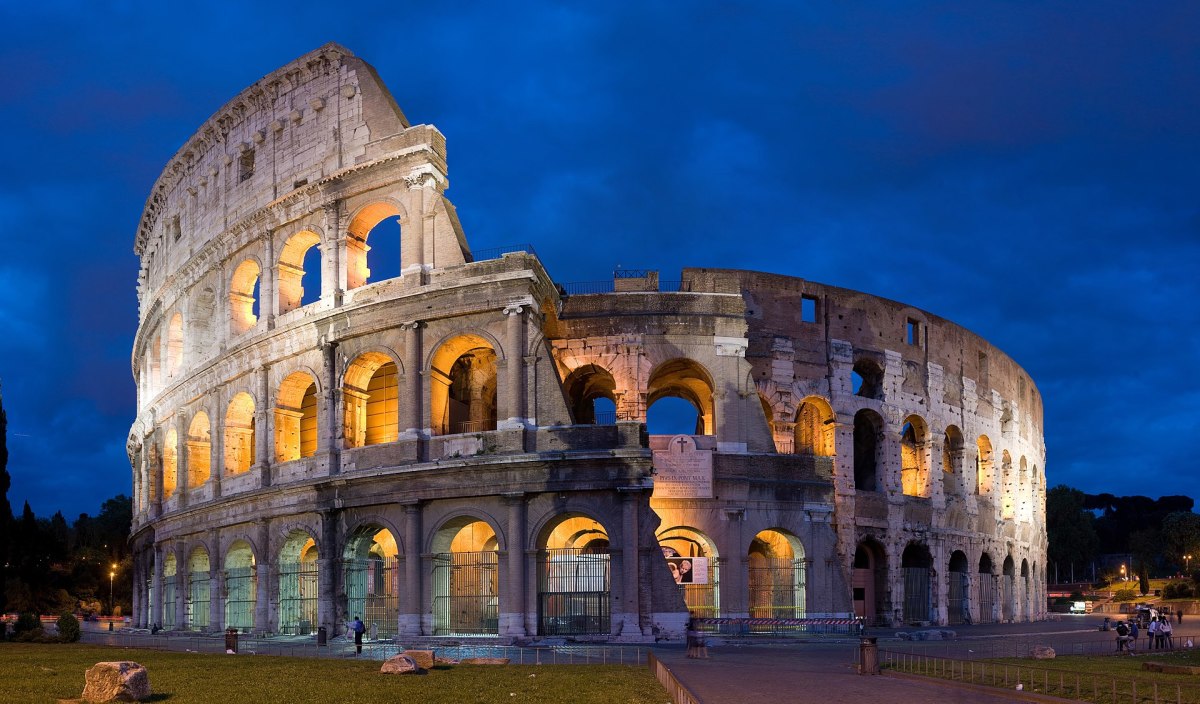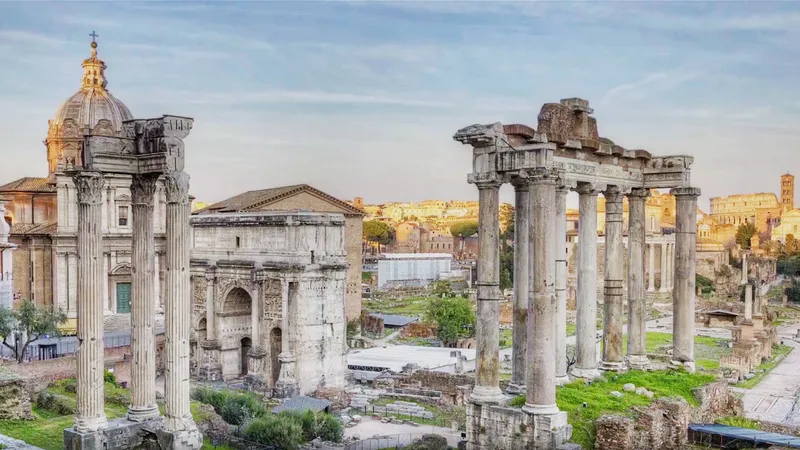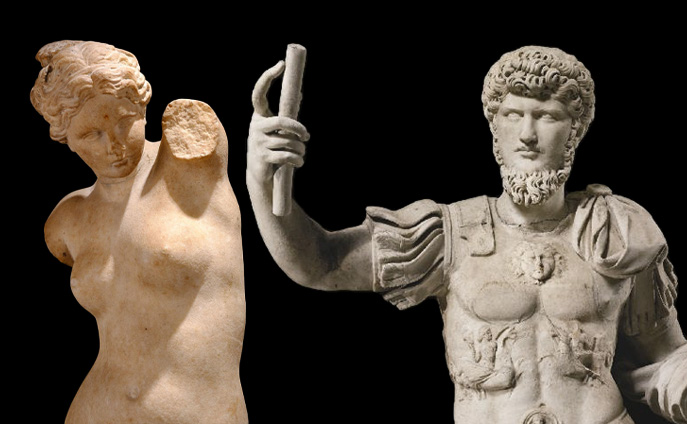The profound influence of Greek culture on Roman civilization is a testament to the power of cultural exchange in shaping societies. As Rome rose to prominence, it encountered the rich traditions, philosophies, and artistic expressions of the Greeks, leading to a remarkable synthesis of ideas and practices. This blog post delves into the various aspects of Greek culture that significantly impacted Roman life, from philosophy and religion to literature and art. By examining these influences, we can better understand how Rome not only adopted but also adapted Greek customs, ultimately crafting a unique civilization that left an enduring legacy on the world.
Influence of Greek Philosophy
The profound influence of Greek philosophy on Roman civilization cannot be overstated, as the intellectual legacy left by Greek philosophers such as Socrates, Plato, and Aristotle played a pivotal role in shaping Roman thought, ethics, and public discourse, intertwining their philosophical inquiries with the practical concerns of governance and civic responsibility that were central to Roman life. The Romans not only admired the intellectual rigor of their Greek predecessors but also actively integrated these philosophical ideas into their own societal frameworks, resulting in a rich tapestry of thought that propelled them toward advances in areas such as political theory, ethics, and metaphysics, demonstrating an evolution of Greek culture through a distinctly Roman lens. As a result, the Roman elite frequently engaged with Greek philosophical texts, employing them to refine their own oratory skills and to inform their political decisions, thereby creating a cultural symbiosis that would resonate through the ages. In examining the transmission of Greek philosophical thought, we must consider the establishment of schools and the emphasis on education throughout Roman society, where the works of notable philosophers were not merely studied but became essential components of a well-rounded education, accessible to those who could afford such enlightenment. By incorporating Greek philosophers' discussions on virtue, politics, and the nature of knowledge, the Romans built upon and transformed these ideas into a suitable framework that addressed their unique social and political challenges, thus embodying the essence of Greek culture within their public and private lives. The echoes of Socratic questioning and Platonic ideals shaped not just personal beliefs but also influenced legislation and moral thought, illustrating a seamless integration of Greek philosophy into the core of Roman identity. Moreover, the influence of Greek philosophy can also be observed in the realm of ethics, where Stoicism, a school of thought that originated in Greece, found fertile ground among Roman thinkers and leaders, providing them with practical guidance that emphasized self-control, resilience, and virtue as ideals to strive for amid the tumultuous realities of political power and societal upheaval. This adoption of Stoic principles allowed Roman statesmen to navigate the complexities of leadership with a philosophical grounding, reinforcing the idea that one's ethical stance played a fundamental role in the maintenance of a well-functioning society. Employing the powerful concepts derived from Greek cultures, such as the importance of rational thought in decision-making and the value of the common good, proved instrumental in the governance of the expansive Roman Empire. In summary, it is evident that the influence of Greek philosophy upon Roman civilization manifests in numerous ways, shaping their intellectual pursuits, educational practices, and ethical frameworks, resulting in a dynamic interplay wherein Greek culture, with its rich philosophical traditions, became intricately woven into the fabric of Roman life and governance. As we analyze the extent of this impact, it is clear that the philosophical inquiries initiated by the Greeks did not fade away but rather were revitalized and adapted, ensuring the enduring legacy of Greek philosophy in guiding Roman ideals and values for generations to come.
- The integration of Greek ideas into Roman educational systems.
- The profound impact of Stoicism on Roman leaders and ethics.
- The intellectual legacy of Greek philosophers in shaping political discourse.
Integration of Greek Gods and Goddesses
The profound integration of Greek gods and goddesses into the Roman pantheon marks a significant aspect of how Greek culture influenced Roman civilization, as the Romans not only adopted the deities of ancient Greece but also reinterpreted their characteristics and attributes, intertwining these divine figures with their own unique cultural practices and beliefs, thus creating a rich tapestry of mythology that blended elements from both civilizations. This process of syncretism did not occur in a vacuum; rather, it was shaped by various social, political, and military interactions between the two civilizations over centuries, leading to a gradual yet profound transformation of religious practices across the Mediterranean region. Classical texts reveal that Roman poets and historians often highlighted the similarities between Greek and Roman deities, presenting them as different manifestations of the same divine ideals that govern human behavior and natural phenomena, portraying figures like Zeus as Jupiter and Aphrodite as Venus, which effectively reinforced the continuity of spirituality despite the shifting cultural contexts.
The Role of Religion in Society
As Greek gods and goddesses became ingrained in Roman society, they played vital roles in various aspects of daily life, including politics, agriculture, and family affairs, indicating the centrality of religious practices in ensuring societal harmony and prosperity, as well as the communal identity that these shared beliefs fostered among the Roman populace. Temples dedicated to these divine figures were constructed throughout the empire, many of which mirrored Greek architectural styles, showcasing the Romans’ reverence for Greek artistry and their desire to emulate the cultural grandeur associated with these deities. Consequently, rituals and festivals honoring these gods became integral to Roman public life, blending Greek traditions with local customs to create a singular cultural experience that further solidified the influence of Greek culture within Roman worship practices.
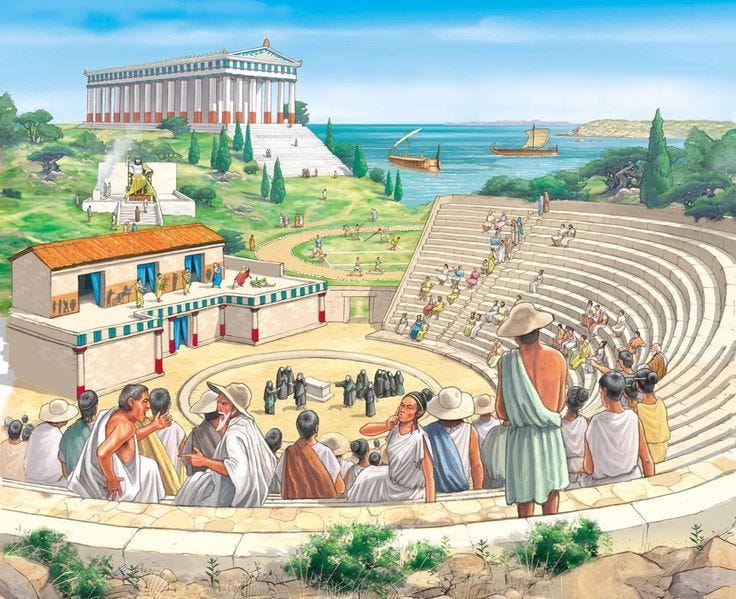
Literary and Artistic Influences
Moreover, the integration of Greek gods and goddesses significantly influenced Roman literature and arts, as poets like Ovid and Virgil often drew upon Greek mythology as a source of inspiration, skillfully weaving these tales into epics and narratives that explored human emotion and the divine's impact upon earthly life, thereby amplifying the relevance of these myths in Roman society. In visual arts, representations of Greek deities in sculpture and painting became prevalent, illustrating scenes of mythological importance that not only reflected the artistic achievements of the time but also served to reinforce the cultural connections between the two civilizations. These artistic expressions not only paid homage to Greek culture but also allowed for the exploration of themes such as love, power, and fate, all of which were central to both Greek and Roman understandings of the human experience and its relationship with the divine.
Adoption of Greek Art and Architecture
Adoption of Greek Art and Architecture
Throughout history, cultures have woven intricate tapestries of influence, and in the case of Roman civilization, the profound impact of Greek culture is unmistakably evident, particularly in the realm of art and architecture, where the Romans adopted and adapted the aesthetics, styles, and techniques initiated by their Greek predecessors, leading to an evolution that would define the very essence of Roman artistry. The embrace of Greek artistic principles can be seen in the grandeur of Roman temples, public buildings, and sculptures, which not only reflected a deep reverence for Greek tradition but also represented an ambitious pursuit of beauty, harmony, and civic identity.
One of the most notable ways the Romans incorporated Greek art into their own was by adopting specific architectural styles, such as those characterized by the use of columns, detailed sculptures, and elaborate friezes that adorned their structures, splendidly showcasing the architectural orders of Doric, Ionic, and Corinthian designs inspired by Greek mastery. As Roman architects experimented with these styles, they also innovated by integrating materials such as concrete and employing advanced engineering techniques, thereby expanding the possibilities for monumental construction that would come to define Rome's urban landscape.
Furthermore, the adoption of Greek art did not stop at architecture alone; it extended to the realm of sculpture and painting, where Roman artists drew from the ideals of realism and idealism that were hallmarks of Greek artistry, resulting in works that embraced both the representation of the human form in its natural state and the aspiration towards an idealized version of reality, which in many cases conveyed deeper cultural and philosophical meanings.
- The use of classical columns, including Doric, Ionic, and Corinthian styles in buildings.
- Extensive use of frescoes and mosaics to embellish living spaces and public buildings.
- Adoption of mythological themes and figures in sculpture and painting.
- Integration of Greek motifs and decorative elements into Roman furniture and household items.
The expansive influence of Greek culture on Roman artistic practices is evidenced through countless archaeological finds and historical accounts, which highlight the way in which Roman artists not only replicated but also reinterpreted Greek masterpieces, creating a distinctive Roman identity that was nevertheless rooted in the classical tradition. Among the most significant Roman adaptations were the modifications made to temple designs, allowing for greater grandeur and functionality, as seen in structures like the Pantheon, which, while showcasing Corinthian detailing, emphasized the Roman penchant for engineering prowess and spatial innovation.
| Greek Style | Roman Adaptation |
|---|---|
| Doric Columns | Used in temples, simplified for strength |
| Ionic Columns | Incorporated into public buildings, emphasizing elegance |
| Corinthian Columns | Popular in lavish structures, showcasing intricate details |
In conclusion, the amalgamation of Greek art and architecture into Roman culture not only signifies an important chapter in the story of Western civilization but also illustrates the idea of cultural exchange and transformation, demonstrating how the Romans engaged with Greek artistic heritage to foster their own identity while simultaneously honoring the accomplishments of their predecessors. Through this complex process of adoption and adaptation, Roman civilization not only celebrated the beauty and ideals exemplified by Greek culture but also established its own enduring legacy that would continue to influence generations to come, reminding us of the timeless nature of artistic expression and the interconnectedness of human creativity.
Ultimately, the adoption of Greek art and architecture stands as a testament to the powerful interrelation between cultures, where the Romans not only inherited a rich artistic legacy but also propelled it forward, creating a unique blend that defined their own civilization and left an indelible mark on the course of history, a legacy that anyone interested in the evolution of art and architecture cannot overlook, and one that serves as a vivid reminder of the profound effects of greek culture on subsequent societies.
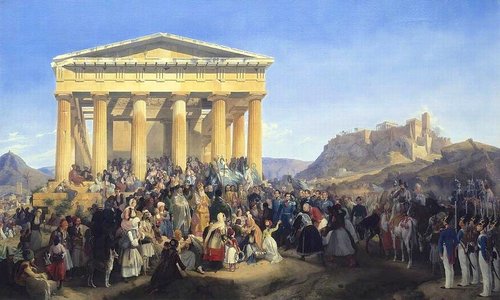
Impact of Greek Language on Roman Society
The profound influence of Greek language on Roman society cannot be overstated, as the adoption of Greek as a lingua franca not only facilitated communication among diverse groups within the vast Roman Empire but also allowed the dissemination of Greek philosophical, scientific, and literary ideas, which were instrumental in shaping Roman thought and culture; thus, through the incorporation of Greek language, Roman citizens were exposed to a rich tapestry of knowledge and expression that defined much of their intellectual landscape. Furthermore, the prevalence of Greek phrases and idioms in everyday Roman speech serves as a testament to the seamless blending of cultures, as educated Romans often strove to reflect the refinement and sophistication associated with Greek linguistic traditions, which in turn allowed for a deeper engagement with the revered works of Greek philosophers and playwrights. In addition, the impact of Greek language on the Roman educational system is evident, as many Roman schools adopted Greek texts as fundamental components of their curriculum, leading to the proliferation of an educated elite who were equally versed in both Latin and Greek, thereby creating a cultural bridge between the two civilizations that would have lasting repercussions on European intellectual history.
| Aspect | Details |
|---|---|
| Communication | Facilitated interaction across different regions of the empire. |
| Education | Greek texts were central to Roman education. |
| Cultural Exchange | Enabled the incorporation of Greek art, philosophy, and literature into Roman society. |
As the Roman Empire expanded, Greek language emerged as an important tool for administration and governance, allowing Roman officials and soldiers to effectively communicate with the diverse peoples they encountered, and this cultural exchange was not merely limited to practical matters but extended to the realms of art and religion, where Greek terms began to infiltrate Latin, thereby enriching the language in ways that would endure long after the decline of the ancient empires. Additionally, Greek language profoundly influenced the realm of literature, contributing markedly to the development of Roman poetry and rhetoric, wherein the stylistic elements of Greek composition were adapted by Roman authors like Virgil and Horace, who utilized Greek literary forms to convey their own narratives and societal critiques. Ultimately, the legacy of Greek language within Roman society is a rich and complex interplay that highlights the importance of linguistic evolution in facilitating cultural transformation, offering a glimpse into how language serves as a conduit for the exchange of ideas, values, and artistic expressions across civilizations.
- Greek as a lingua franca fostered communication in the Roman Empire.
- The educational system incorporated Greek language and texts.
- Greek language enriched Latin through various cultural exchanges.
- Influences on Roman literature are evident through adaptations of Greek forms.
- The legacy of Greek language persists in modern languages and cultures.
Assimilation of Greek Education System
The assimilation of the Greek education system into Roman civilization marked a transformative period in the intellectual landscape of ancient Rome, whereby the Romans, keenly aware of the cultural and philosophical advancements achieved by the Greeks, adopted and adapted a variety of educational methodologies that were pivotal in shaping the minds of Roman citizens. This process involved not only the incorporation of Greek texts, philosophies, and pedagogical techniques but also the establishment of institutions akin to those found in Greece, which emphasized rhetoric, grammar, and philosophy, ultimately facilitating a more sophisticated and well-rounded approach to education that would greatly influence future generations. As a consequence, the Greek education system became an integral part of Roman civilization, providing the groundwork for a more literate and culturally aware society, one that would extol the virtues of learning and critical thinking as central tenets of its identity.
| Aspect of Education | Greek Influence | Roman Adaptation |
|---|---|---|
| Curriculum | Focus on rhetoric, grammar, and philosophy | Inclusion of legal studies and oratory |
| Methodology | Socratic questioning and dialogue | Utilization of practical exercises and debate |
| Institutions | Gymnasiums and Philosophical schools | Establishment of schools and libraries |
In their pursuit to enhance their educational framework, the Romans were particularly influenced by the Greek emphasis on philosophical discourse, which encouraged students to engage in rigorous debates and examine the principles underlying their world, a practice that proved invaluable in producing some of the greatest thinkers and statesmen of Roman society. Furthermore, the role of educators, known as philosophers or grammatici, became highly esteemed within Roman culture, growing from the Greek tradition of valuing intellectual mentorship and guidance, to the extent that many wealthy Roman families sought private tutors from Greece to ensure their children received the best possible education. This incorporation of Greek educational practices not only stimulated the intellectual growth of individuals but also fostered a broader cultural exchange that significantly contributed to the development of Roman identity. As a final point, it is essential to understand that while the Romans adopted many aspects of Greek culture, including the education system, they also infused their own unique elements into this framework, leading to a hybrid model of education that reflected the values and priorities of Roman society, which were often centered around practical governance and civic duty. In this regard, the assimilation of the Greek education system serves as a testament to the adaptability and receptiveness of Roman culture to external influences, which ultimately enriched its own heritage. Thus, we can conclude that the impact of Greek culture on the Roman education system was profound and far-reaching, paving the way for a legacy of learning that would resonate throughout history and continue to inform educational practices for centuries to come.
- Greek emphasis on rhetoric and dialogue.
- Roman adaptation to include practical applications.
- Rise of private tutoring from Greek educators.
- Integration of legal and civic studies into the curriculum.
- Cultural exchange leading to a more diverse educational landscape.
Incorporation of Greek Mythology into Roman Literature
The profound integration of Greek mythology into Roman literature marked a significant cultural evolution, highlighting not only the admiration that the Romans held for the stories and characters of their Greek predecessors but also their innovative adaptations that mirrored the complexities of Roman society, revealing a rich tapestry of narrative that blended homage with transformation. From early poets to later epic writers, Roman authors displayed a keen interest in the deities, heroes, and mythological tales that had been cherished in Greek culture, often redefining these figures to better serve their narratives or provide commentary on Roman values and ideals. This literary phenomenon not only enriched the Roman literary canon but simultaneously fostered a deeper appreciation for the Greek traditions that had, by then, permeated much of Roman cultural life. One of the most notable examples of this incorporation is evident in the epic poetry of Virgil, particularly in his renowned work, the Aeneid, where he not only pays tribute to the Greek epic tradition, but also reinterprets prominent Greek figures. Aeneas, the protagonist, mirrors the heroism of Homeric characters while simultaneously embodying Roman virtues such as duty and piety, which were central to the Roman identity. Furthermore, Roman poets like Ovid took creative liberties in their retellings of mythical tales, intricately weaving Greek myths into a Roman context that emphasized themes relevant to his contemporaries.
- The use of Greek gods as characters in Roman literary works provides insight into Roman values.
- Virgil's Aeneid presents a fusion of Greek mythology and Roman ethos, showcasing a blend of cultural tales.
- Ovid's Metamorphoses serves as a significant text that illustrates the fluidity and adaptation of Greek myths for a Roman audience.
Through such literary endeavors, the Romans were able to craft stories that resonated with their societal norms, often using Greek myths as a foundation upon which they could build narratives that were distinctly their own, thus ensuring that Greek culture continued to echo through the ages in varying forms within the fabric of Roman civilization. Moreover, the conventions of Greek storytelling, including themes of fate and transformation, were adeptly employed by Roman writers to reflect the complexities of human experience, societal expectations, and the perpetual quest for identity in a rapidly evolving world. In this way, the incorporation of Greek mythology into Roman literature not only preserved these ancient tales but also revitalized them, illustrating the timeless nature of these myths and their relevance across different eras and cultures.
Adoption of Greek Clothing and Fashion Trends
The profound adoption of Greek clothing and fashion trends by the Romans represents a significant cultural exchange that seamlessly integrated the aesthetics and stylistic preferences of Greek civilization into the fabric of Roman society, influencing everything from daily wear to ceremonial attire, which exemplifies how the Romans sought not only to emulate the revered Greek culture but also to elevate their own social status and identity through these fashionable choices. As the Romans ventured through the Hellenistic world, they encountered a plethora of Greek garments such as the chiton, a garment characterized by its simple yet elegant draping that embodied both comfort and grace, as well as the himation, which served as a versatile wrap that allowed wearers to express individuality while adhering to societal norms of modesty and decorum, creating an environment where Greek fashion became synonymous with cultural sophistication and refinement. This adoption of Greek clothing was not merely driven by aesthetic appreciation; it also symbolized a deeper admiration for Greek ideals of beauty, philosophy, and lifestyle that the Romans sought to embody within their own civilization. The integration of Greek fashion trends into Roman attire diverged into various styles that were adapted and modified to suit Roman tastes, catering to the unique social and political climate of the time, thus transforming simplistic notions of Greek garments into grand displays of wealth and power within Roman society. The toga, for instance, became a quintessential Roman garment, but its evolution was significantly influenced by the Greek himation, and when draped elegantly, it not only signified citizenship but also hinted at the person’s status and prestige within the societal hierarchy, attaching a sense of importance and gravitas to the individual wearing it. Moreover, the Romans also embraced the use of fine materials such as silk and embroidered fabrics, which were often sourced from the Eastern Mediterranean, allowing for more luxurious and diverse clothing options that further exemplified the Romans' desire to emulate the prestigious lifestyle associated with Greek culture, all the while crafting a distinctive Roman identity in the realm of fashion.
- The chiton: A simple tunic worn by both men and women, highlighting freedom of movement and comfort.
- The himation: A versatile outer garment that allowed for various styles of draping, reflecting individuality.
- The toga: A symbol of Roman citizenship that drew inspiration from Greek examples, representing status and decorum.
- Use of fine materials: The introduction of silk and embellished fabrics from the East that elevated Roman clothing.
In conclusion, the adoption of Greek clothing and fashion trends profoundly impacted Roman civilization, as it not only influenced what was worn during various occasions but also shaped the social dynamics and cultural perceptions of identity within the Roman Empire. By embracing and adapting Greek styles, the Romans cultivated a complex relationship with Greek culture, balancing their distinct identity while paying homage to the values and aesthetics that the Greeks so passionately immortalized. This melding of influences paved the way for a richly textured tapestry of styles that would resonate throughout history, reflecting the ongoing dialogue between these two great civilizations and their enduring legacy in the realm of fashion and culture across the centuries.
Influence of Greek Theater on Roman Entertainment
The remarkable influence of Greek theater on Roman entertainment is a testament to the profound admiration that the Romans held for their Greek predecessors, as the intricacies of dramatic performances, the exploration of human emotions, and the compelling storytelling that originated in Greece ultimately found their way into the heart of Roman cultural practices, profoundly shaping the theatrical landscape of ancient Rome. It is important to note that the Greeks developed a rich tradition of dramatic arts which included distinct genres such as tragedy and comedy, both of which captivated audiences and set the stage for a transformative theatrical experience that the Romans would eagerly adopt and adapt to their own cultural milieu. As this transformative process unfolded, the Romans not only borrowed the thematic and structural elements of Greek theater but also sought to enhance and localize these aspects to suit their societal norms and public entertainment, thereby fostering a unique identity that resonated with the Roman populace. In the Roman adaptation of Greek theatrical traditions, several key features emerged that made a significant impact on their entertainment practices, including the following aspects:
- The incorporation of Roman themes and historical figures into the existing Greek theatrical framework, thus enriching the content and making it more relatable to the Roman audience.
- The introduction of elaborate staging and complex sets, which aimed to create immersive experiences for viewers and elevate the overall quality of the performances.
- The emphasis on loud and exaggerated expressions by actors, which was influenced by the Greek tradition but intensified to cater to the larger amphitheaters and to ensure that the performances reached audiences far and wide.
Moreover, with the construction of grand theaters throughout Rome, such as the famous Pompey Theater, the popularity of theatrical performances soared, leading to a flourishing of the arts that manifested in various festivals and competitions dedicated to dramatic arts, with the Romans establishing their own festivals like the Ludi Romani to celebrate theater and pay homage to their Greek counterparts. As a result of these changes, Roman theater not only evolved dramatically but also gave rise to a new generation of playwrights who, inspired by Greek masters like Aeschylus, Sophocles, and Euripides, crafted their own unique works that explored themes of morality, politics, and social issues relevant to their time, all while remaining reminiscent of the foundational elements laid down by Greek theater. In conclusion, the enduring legacy of Greek theater on Roman entertainment highlights the profound interconnections between these two great civilizations, where each contributed to the other's growth and understanding of dramatic arts, making it evident that the vibrant tapestry of entertainment in ancient Rome cannot be fully appreciated without acknowledging the significant role that Greek culture played in shaping its identity. Through this intricate web, we glimpse not only the artistic innovations that arose during this era but also the ways in which cultural exchanges have historically enriched societies, leaving an indelible mark on the pages of history and the worlds of theater and entertainment.
Frequently Asked Questions
What are the key contributions of Greek culture to Roman civilization?
Greek culture influenced Roman civilization in numerous ways, including literature, philosophy, art, and architecture. The Romans adopted Greek styles in their sculptures and buildings, and incorporated Greek mythology and literature into their own.
How did Greek philosophy impact Roman thought?
Greek philosophy introduced concepts of ethics, metaphysics, and epistemology to Roman thinkers. Stoicism and Epicureanism became particularly influential, shaping moral viewpoints and guiding the lives of many prominent Romans.
In what ways did Greek art influence Roman sculpture?
Roman sculpture was heavily inspired by Greek techniques and styles. The Romans emulated the realism and idealism portrayed in Greek statues, creating works that celebrated both individual identity and collective values.
What was the role of Greek language in Roman education?
Greek was the language of the educated elite in Rome. Many Roman aristocrats studied Greek philosophy, literature, and rhetoric, making it essential for anyone who aspired to attain a high status in society.
How did Greek mythology integrate into Roman culture?
The Romans adopted many Greek gods and myths, often renaming them, such as Zeus becoming Jupiter and Hera becoming Juno. Greek myths were adapted into Roman literature, rituals, and everyday life.
What architectural styles did the Romans borrow from the Greeks?
The Romans borrowed several architectural styles from the Greeks, including the use of columns (Doric, Ionic, and Corinthian orders) and the principles of symmetry and proportion, which they incorporated into their temples, public buildings, and monuments.
How did Greek culture help unify the Roman Empire?
Greek culture served as a common cultural foundation across the diverse regions of the Roman Empire, promoting connectivity and communication among different peoples. This shared cultural heritage facilitated trade, governance, and social cohesion.


